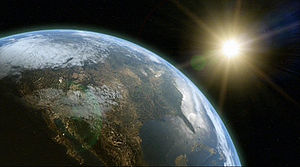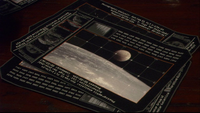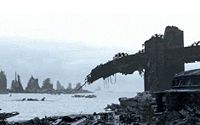Earth (RDM): Difference between revisions
More languages
More actions
Spencerian (talk | contribs) Concised and conventionized. Speculation should be limited now; the series is over. |
No edit summary |
||
| Line 52: | Line 52: | ||
==A New Earth== | ==A New Earth== | ||
During a cataclysmic battle in which the Cylon [[The Colony|Colony]] is destroyed, Kara Thrace (using data she gathers from [[The Music]]) jumps ''Galactica'' into the vicinity of a habitable planet, already populated by a rich diversity of wildlife and by primitive humans that evolved independently from those on Kobol. The Fleet is given coordinates to this planet by a Raptor from ''Galactica'' at the scheduled rendezvous, and jumps into the system to settle the planet. | During a cataclysmic battle in which the Cylon [[The Colony|Colony]] is destroyed, Kara Thrace (using data she gathers from [[The Music]]) jumps ''Galactica'' into the vicinity of a habitable planet, already populated by a rich diversity of wildlife and by primitive humans that evolved independently from those on Kobol. According the Laura Roslin, this new Earth may have more biodiversity than the entire Twelve Colonies combined. The Fleet is given coordinates to this planet by a Raptor from ''Galactica'' at the scheduled rendezvous, and jumps into the system to settle the planet. | ||
The people of the Fleet decide to abandon their technology in an attempt to avoid repeating the cycle of destruction and rebirth, and the planet is named after the original Earth. ''Galactica'' and the rest of her Fleet are destroyed by being flown into the system's Sun by Samuel Anders, now effectively a [[Hybrid]]. The [[Two]]s, [[Six]]es and [[Eight]]s decide to live on the new Earth as well and give their [[Rebel basestar|baseship]] to their [[Cylon Centurions|Centurions]] so that they, too, can have freedom and find their own destiny. | The people of the Fleet decide to abandon their technology in an attempt to avoid repeating the cycle of destruction and rebirth, and the planet is named after the original Earth. ''Galactica'' and the rest of her Fleet are destroyed by being flown into the system's Sun by Samuel Anders, now effectively a [[Hybrid]]. The [[Two]]s, [[Six]]es and [[Eight]]s decide to live on the new Earth as well and give their [[Rebel basestar|baseship]] to their [[Cylon Centurions|Centurions]] so that they, too, can have freedom and find their own destiny. | ||
Revision as of 03:48, 23 March 2009

Earth is the believed destination of the Thirteenth Tribe of Kobol, as attested in the Sacred Scrolls. Its existence was more myth and legend than reality to the modern world of the Twelve Colonies of Kobol.
Earth, in the course of events, was actually not one but two planets. The first was a planet which was not only destroyed by a nuclear holocaust thousands of years ago, but was entirely populated by a type of humanoid Cylon. The second Earth is a lush, habitable world already filled with bands of primitive humanity.
The Fleet was led to both planets by Kara Thrace. It is on the second Earth that the beleaguered inhabitants of the Fleet find their new permanent home, leaving their ships (and technology) all behind.
A Cause for Hope
Earth is first mentioned by Commander Adama during a speech after the battlestar's services for the dead after escaping from Ragnar Anchorage (Miniseries, Part 2). Adama claims that Earth was a top military secret that can now be revealed. Later, in a private conversation with new President Laura Roslin immediately afterward, Adama admits that he has not the slightest idea where Earth may be, if it exists at all. His true motivation was inspirational; he intended to bolster the morale of the population (especially his beleaguered crew) in the aftermath of the near-annihilation of humanity.
Tangible Faith
While she is initially skeptical, rebuking Adama for his dishonesty, Laura Roslin's faith grows perceptibly throughout the first season. Her use of chamalla to treat her cancer causes vivid dreams and hallucinations. Roslin increasingly interprets these as prophetic visions, especially after the Fleet accidentally discovers the legendary homeworld of Kobol (Kobol's Last Gleaming, Part I).
Eventually, a religious artifact is recovered, the first in a series of waypoints to the general location of Earth (Home, Part II).
In the activated Tomb of Athena, the stars of the Twelve Colonies are represented in the twelve Zodiacal constellations, as viewed from Earth, recognized by Roslin as the shapes of the original flags of the Twelve Colonies. The chamber itself was intended by its builders to be a stylized replica of the night sky of the Earth, from which all twelve constellations could be seen. This is corroborated by Kara Thrace, who quotes scripture, saying that Earth was the place where the people of the Thirteenth Tribe could look up into the sky and see their twelve brothers.[1]
Morerover, Lee Adama recognizes the Lagoon Nebula, also represented in the night sky of the mystery chamber. This astronomical object is known to Fleet personnel, since Commander Adama remarks that this celestial body would take some time to reach.
More Clues to Earth
Over a year later, the Fleet discovers a derelict Cylon baseship near the Lion's Head Nebula, a celestial marker revealed by Felix Gaeta to Admiral Adama and President Roslin (Torn). The information is derived from Gaius Baltar's research on the path to Earth. The derelict basestar finds an ancient beacon left by the Thirteenth Tribe. While a Colonial boarding party finds the probe, it also learns that the humanoid Cylons aboard the basestar are dead or dying, suggesting a deadly pathogen was released by the beacon. In their haste to leave and for the safety of the Fleet, the beacon is abandoned on the basestar, where it is destroyed when the basestar self-destructs (A Measure of Salvation).[2]
After the Fleet must gather needed foodstuffs from the algae planet, believed previously uninhabited by humans, Galen Tyrol senses and finds the Temple of Five, an ancient temple built by the Thirteenth Tribe, as told in the Sacred Scrolls, apparently built during a stopover on this world. Believed to be hidden inside the Temple of Five is the Eye of Jupiter, an artifact that may provide more clues to the location of Earth. However, a Cylon force arrives with the same intentions on the Eye, leading to a standoff between Adama and the basestar command (The Eye of Jupiter). The Eye is later revealed to be the algae planet's own star as it began to nova, taking the form of the circular starburst patterns throughout the Temple of Five. While the Colonials are not privy to the special holograph feature of the Temple that the Cylons witness in the early moments of the nova, the Colonials are later are able to discern the information of the new nova as a waypoint to the next marker, a nebula in the Ionian system (Rapture).
When the Fleet arrives at the nebula, it is intercepted by four basestars. Unable to escape due to a mysterious, crippling Fleet-wide power outage, Galactica is forced to prepare for attack and launches Vipers and Raptors. Apollo breaks off from the attack to track an "Unknown" contact on DRADIS. The contact is Captain Kara "Starbuck" Thrace, miraculously returned from the dead with news that she has been to Earth, knows its location and how to take the Fleet there.
The episode "Crossroads, Part II" concludes with a sweeping zoom from the Fleet, the Cylons, the Ionian nebula and to an arm of the Milky Way and to a zoom in to the second Earth, confirming that Earth is an actual location (from the perspective of the viewers), showing Earth's North American continent.[3]
According to the Hybrid, the Final Five are from the "home of the 13th," generally interpreted as the first Earth (Faith). This matches statements made in the "The Eye of Jupiter" claiming that the Temple of Five was built by people from the Thirteenth Tribe.
Starbuck's Visit

Starbuck claims she visited Earth in her Viper, a trip lasting 6 hours according to her Viper's clock but months having passed in the Fleet. She is unaware of how she got to and from Earth in a Viper with no FTL capability. She describes Earth as having blue seas and white clouds, and took a variety of photos from her Viper. She also describes a "yellow moon and star" matching the descriptions by Pythia. Her photos have star patterns matching the zodiacs seen in the Tomb of Athena. On the return trip, she describes seeing a ringed gas giant planet, a "flashing triple star" and a comet. This turns out to be a vision of a burning basestar (the comet) around a gas giant at the site of a Cylon Civil War battle (Faith).
After the Fleet leaves the Ionian Nebula, Thrace feels pain with each jump and is overcome by a strong sense that the Fleet is going the wrong way (He That Believeth In Me). She confronts President Roslin, the only person she reckons can persuade the Admiral to change course, with a pistol in his quarters, which gets her thrown in the brig. She is later released to take command of the Demetrius on a mission to find Earth (Six of One).
Arrival and Ruins

After being informed by Anders and Tyrol that something about her Viper is different, Starbuck climbs in the cockpit and powers up the electronics, detecting what appears to be a Colonial emergency locator signal, which only the Viper can receive. After determining that it is likely a bearing to Earth, the Fleet plots a jump and arrives in the planet's orbit, leading to ecstatic jubilation throughout the Fleet.
However, the happiness is short-lived when a combined human-Cylon team lands on the planet and arrives at a shore, overlooking a destroyed city. Moreover, Geiger counters detect radioactivity, indicating the city — and possibly the whole planet — suffered a nuclear catastrophe (Revelations).
The ruins are "thousands of years old." (Battlestar Galactica: The Top 10 Things You Need to Know).
Further scans on the planet reveal that the planet suffered a nuclear holocaust of some kind about 2,000 years before. There was still low-level radiation in the ground and water from the disaster and it is unsafe for living on even after so long. Further investigation reveals the truth about the inhabitants of the planet: the Thirteenth Tribe were a kind of Cylon. Among them lived, once upon a time, the Final Five, whose memory of the destruction appears in fragments while exploring the ruins.
This Earth, destroyed and poisonous, is abandoned. The Fleet, gravely demoralized, begin a half-hearted search for another planet to inhabit (Sometimes a Great Notion).
Samuel Anders, his memories of his past life fully available to him after being shot, implies that the Centurions on Earth did kill their masters. When he describes when the Final Five finally reached the Twelve Colonies, Anders retorts, "It happened again!" (No Exit)
A New Earth
During a cataclysmic battle in which the Cylon Colony is destroyed, Kara Thrace (using data she gathers from The Music) jumps Galactica into the vicinity of a habitable planet, already populated by a rich diversity of wildlife and by primitive humans that evolved independently from those on Kobol. According the Laura Roslin, this new Earth may have more biodiversity than the entire Twelve Colonies combined. The Fleet is given coordinates to this planet by a Raptor from Galactica at the scheduled rendezvous, and jumps into the system to settle the planet.
The people of the Fleet decide to abandon their technology in an attempt to avoid repeating the cycle of destruction and rebirth, and the planet is named after the original Earth. Galactica and the rest of her Fleet are destroyed by being flown into the system's Sun by Samuel Anders, now effectively a Hybrid. The Twos, Sixes and Eights decide to live on the new Earth as well and give their baseship to their Centurions so that they, too, can have freedom and find their own destiny.
Over 150,000 years later, Earth is home to a technically advanced civilization. (They are all, of course, of native human, Colonial human, and humanoid Cylon descent, but knowledge of this extraterrestrial seeding does not exist). Its people on the verge of major breakthroughs in robotics again.
The fossilized remains of Hera Agathon have been recovered from the land of Tanzania by archaeologists from the Smithsonian Institute in the city of Washington, who have identified her as the "Mitochondrial Eve", the most recent common ancestor of all living humans in the direct maternal line (Daybreak, Part II).
Official Statements
- Edward James Olmos jokingly describes how he thinks the Fleet could find Earth:
- I personally — this is not [from] any of the writers, but my thing — I wanted to come into [the present day], find Earth, cruise on top of it, see it for what it is, and as we're coming down to it, we're blown up, we're nuked. And then [someone says to] the President of the United States, which is [George W.] Bush, "They've been taken care of. Thank God you saved the world again." And you turn, and you see who told him that, and it's one of the Cylons. [Laughs][4]
References
- ↑ Early series speculation questioned how the Tomb could indicate Earth's location before the Thirteenth Tribe left for Earth. The answer is revealed by the existence of descendants of the Thirteenth Tribe--the Final Five--a type of humanoid Cylon that migrated to Earth from Kobol, and, later, is believed to have left clues to find Earth during their long journey to find the Twelve Tribes to warn them in the treatment of their Cylon creations.
- ↑ With the revelation that the Final Five probably left this marker, it may be that the humanoid Cylons of Earth built up an immunity to any pathogens accidently left on the probe that would later kill their creations.
- ↑ The depiction of Earth includes a geographically accurate landmark: the Balize lobe of the Mississippi river delta, a feature formed between the 16th and 20th Centuries of the real-world Earth. However, in Daybreak, Part II it was shown that the series was set circa 148,000 BC. This is most likely an error in graphic effects.
- ↑ Vary, Adam B. (23 March 2007). Four-ward, Cylons: Edward James Olmos (backup available on Archive.org) (in ). Retrieved on 22 June 2007.
<pagesidebar>
- See Also
- Sacred Scrolls#The Origin of Mankind|Origin of Mankind theories
- Other Series
- Earth (TOS)|Earth from TOS
- Earth (1980)|Earth from "Galactica 1980"
</pagesidebar>
